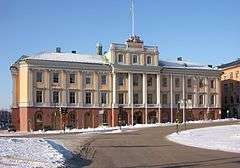Ministry for Foreign Affairs (Sweden)
| Utrikesdepartementet | |
 Arvfurstens palats, the seat of the Ministry of Foreign Affairs, at Gustav Adolfs torg in Stockholm. | |
| Agency overview | |
|---|---|
| Formed | 1840[1] |
| Ministers responsible | |
| Website |
www |
 |
| This article is part of a series on the politics and government of Sweden |
|
| Foreign relations |
|
Related topics |
The Ministry for Foreign Affairs (Swedish: Utrikesdepartementet) is responsible for Swedish foreign policy.
Current ministers:
- Margot Wallström (s) Head of Office and Minister for Foreign Affairs.
- Isabella Lövin (mp) as Minister for International Development Cooperation
History
The ministry for Foreign Affairs was created in 1791 when King Gustav III set up Konungens kabinett för den utrikes brevväxlingen (The King's cabinet for Foreign Letters of Exchange ). In 1840 the organisation formally changed its name to Utrikesdepartementet.
Government agencies
The Ministry for Foreign Affairs are principal for the following government agencies:
The Legations and Embassies in foreign countries, are under the direct authority and control of the Ministry of Foreign Affairs.
- Swedish National Export Credits Guarantee Board, or Exportkreditnämnden (EKN). (Official site)
- Folke Bernadotte Academy, or Folke Bernadotteakademin. Located on Sandö in Kramfors. (Official site)
- Swedish National Inspectorate of Strategic Products, or Inspektionen för strategiska produkter (ISP). (Official site)
- Swedish National Board of Trade, or Kommerskollegium. (Official site)
- Nordic Africa Institute, or Nordiska Afrikainstitutet. Located in Uppsala (Uppsala University). (Official site)
- Swedac (SWEDAC), formally Styrelsen för ackreditering och teknisk kontroll. Located in Borås. (Official site)
- Sida, formally Styrelsen för internationellt utvecklingssamarbete. (Official site)
- Swedish Institute, or Svenska institutet (SI). (Official site)
- Business Sweden, or Sveriges export- och investeringsråd. (Official site)
- Swedish Trade Council, or Sveriges Exportråd. Located in Stockholm. (Official site)
Statement of Swedish Foreign Policy 2012
- Human rights, peace, freedom and democracy these values shape our Swedish foreign policy
- Europe must be a strong voice and a clear force for peace, freedom and reconciliation in our own region and the world
- Sweden's security is built in solidarity with others. Threats to peace and security are averted collectively and in cooperation
- Freedom on the Internet is the new front line in efforts for freedom in the world
- The Arctic region is clearly growing in importance: better conditions for the peoples of the region, protect sensitive nature and environment
- We must increase pressure on the regime and support to those who are working for a peaceful transition to a democratic Syria
- The worlds economies are becoming increasingly interlinked. Trade and investment generate growth and employment
- A clear emphasis on democracy and human rights and freedoms is central to modern development assistance
- Women are a driving force for increased democratic rights and freedoms, as we saw during the upheavals in the Arab world
References
- ↑ "Utrikesdepartementet". Nationalencyklopedin (in Swedish). Retrieved 13 November 2010. (subscription required)
External links
- Ministry for Foreign Affairs - Official site
This article is issued from
Wikipedia.
The text is licensed under Creative Commons - Attribution - Sharealike.
Additional terms may apply for the media files.